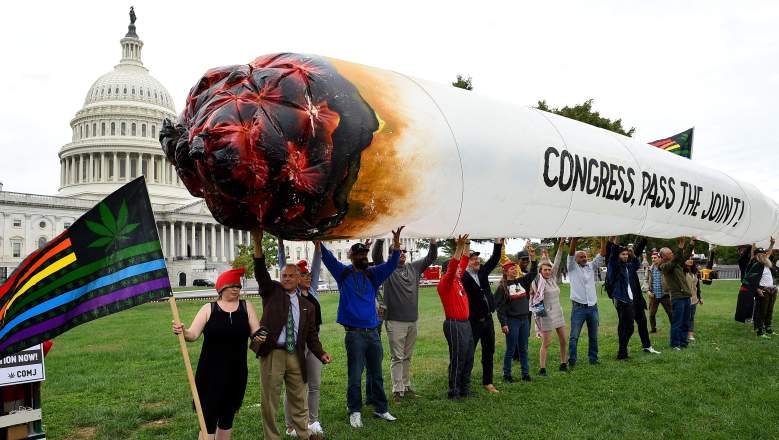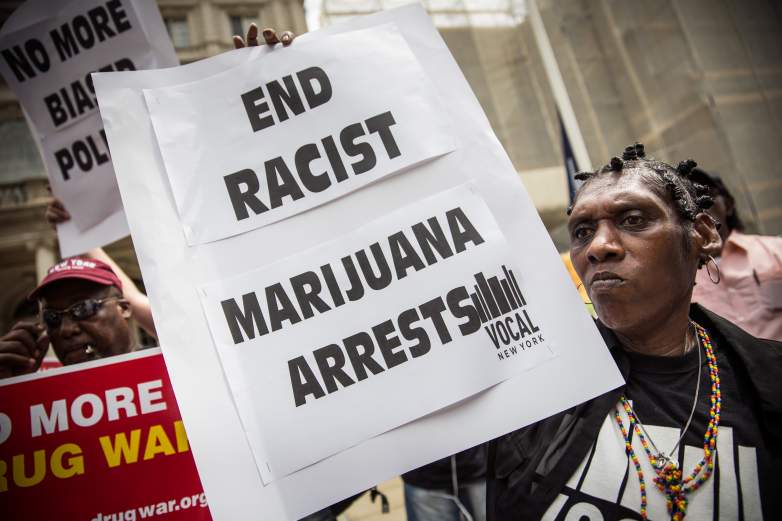
The United States House of Representatives voted to federally decriminalize marijuana Friday with a 219 to 162 vote in favor of the Marijuana Opportunity Reinvestment and Expungement Act of 2019, also called the MORE Act.
According to the bill summary, The MORE Act aims to “remove marijuana from the list of scheduled substances under the Controlled Substances Act and eliminates criminal penalties for an individual who manufactures, distributes, or possesses marijuana.”
While the MORE Act still needs to pass the Republican-run senate, the vote is historical in that it is “the first time a full chamber of Congress has taken up the issue of federally decriminalizing cannabis,” NBC News reported.
The unprecedented vote has come after two decades of states slowly chipping away at marijuana laws in tandem with the public’s changing perception of the dangers and uses of the cannabis plant.
The Bill Was Expected to Pass the Democratic Majority of the House, but the Republican Majority of the Senate Is Unlikely to Pass the MORE Act
An article published on Nasdaq says that even if the MORE Act passed the House, it would be “dead on arrival” once it went to a vote in the Senate where Republicans, who “historically have a more adverse view of marijuana than Democrats or Independents,” are the majority.
An example of the difference in support for more lax marijuana laws can already be seen in Friday’s votes from the House on the MORE Act. Only six Democrats who voted on the bill voted that they did not support federally decriminalizing marijuana. Just five Republicans who voted on the MORE Act voted yes.
According to Sean Williams, who wrote the Motely Fool story published on Nasdaq, a big obstacle in the way of getting the legislation passed is Senate Majority Leader Mitch McConnel. Williams wrote:
One problem is that Senate Majority Leader Mitch McConnell (R–Ky.) has no intention of allowing cannabis legislation to hit the Senate floor for a vote. McConnell has not minced words about marijuana in the past and has purposefully blocked reform measures before. Put simply, as long as McConnell is Senate Majority Leader, there’s virtually no chance of any House-sponsored cannabis reforms ever seeing the light of day in the Senate.
But McConnell is not alone in being against the MORE Act. Rep. Debbie Lesko, R-Ariz., told NBC News in an emailed statement she will be voting against the legislation, saying the bill was a “waste” of the House’s time because it “will never be signed into law.”
According to NBC News, Lesko said in a statement, “Not only is this a dereliction of duty, but the bill is simply bad policy. It does nothing to deter the use of marijuana by children, fails to require a warning label on the health risks posed by marijuana, and disregards science that shows marijuana directly affects parts of the brain responsible for memory and learning.”
Supporters of the Bill Say Marijuana Laws Disproportionally Discriminate Against People of Color & Passing the MORE Act Could Bring ‘Restorative Justice’

GettyElizabeth Owens protests on the steps of New York City Hall in support of the proposed Fairness and Equity Act, which would attempt to reform racially biased arrests in regards to marijuana possession in New York state on July 9, 2014, in New York City.
Lawmakers in support of the bill say that the MORE Act would be a step in the right direction to help diminish discriminatory practices regarding marijuana arrests of people of color.
Rep. Barbara Lee, D-Calif., who co-sponsored the bill said, “For decades, discriminatory cannabis policies have perpetuated yet another form of systemic racism in America, and this legislation will begin the process of restorative justice for those most harmed,” according to NBC News.
Lee is referring to the ongoing statistics that show Black people are more often arrested on possession of marijuana charges than whites even though rates of usage among both races are comparable.
In a 2020 report by the American Civil Liberties Union called A Tale of Two Countries: Racially Targeted Arrests in the Era of Marijuana Reform, they found that “Black people are 3.64 times more likely than white people to be arrested for marijuana possession despite comparable marijuana usage rates…and the racial disparities in arrest rates remain in every state.”
Representative Hakeem Jeffries, Democrat of New York told the New York Times, “Marijuana use is either socially acceptable behavior or it’s criminal conduct. But it can’t be socially acceptable behavior in some neighborhoods and criminal conduct in other neighborhoods when the dividing line is race.”
If passed the bill would mean federal inmates convicted of certain marijuana charges could be released from prison and their convictions expunged depending on outcomes of sentencing review hearings related to federal cannabis offenses.
The MORE Act also seeks to “set up grant programs focused on providing job training, legal aid, and substance use treatment, as well as grants for small businesses in the marijuana industry led by low-income and minority business owners. Physicians with the Department of Veterans Affairs would also be allowed for the first time to recommend medical marijuana to their patients,” according to the New York Times.
But all of that is moot, for now, if it does not pass a Senate vote.
Williams wrote, “I don’t believe a bill like the MORE Act has any shot of being passed prior to mid-2021, at the earliest, but it would depend on the political make-up of Congress, as well as who’s elected president.”
President-Elect Joe Biden has said he supports the decriminalization of marijuana.
He said, “We should decriminalize marijuana. Wipe out the record so you can actually say, in honesty, ‘have you ever been arrested for anything?’ You can say ‘no’ because we’re going to pass a law saying there is no background you have to reveal relative to the use of marijuana,” Marijuana Moment reported.
READ NEXT: 80-Year-Old Florida Woman Raped for Months by Ex-Son-In-Law: Police